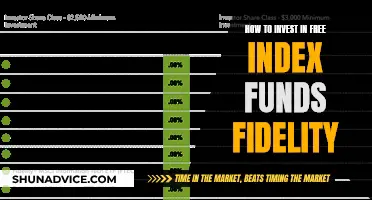
Cash investments are a great way to generate modest returns while keeping your money safe and close at hand. They are short-term obligations, typically with a maturity period of fewer than 90 days, that provide returns in the form of interest payments. These investments are ideal for those seeking to preserve their capital and are usually undertaken by investors who need a temporary place to keep their cash while exploring other investment opportunities. Money market accounts and certificates of deposit are common examples of cash investments. When considering how to invest in cash funds, it's important to assess your risk tolerance, time horizon, and financial goals.
| Characteristics | Values |
|---|---|
| Risk | Very low |
| Returns | Low |
| Accessibility | High |
| Investment period | Short-term |
| Interest payments | Periodic |
| Investment options | Cash management accounts, money market funds, certificates of deposit (CDs), savings accounts, treasury bills |
What You'll Learn

Understanding cash investments
Cash investments are a type of short-term financial instrument with high liquidity, minimal market risk, and a maturity period of fewer than 90 days, with some sources stating this period is typically less than three months. They are considered one of the safest investments due to their low risk of loss and high level of accessibility.
Cash investments are often chosen by investors who need a temporary place to keep their money while researching other investment products. They are also a good option for those who want to preserve their capital and are happy with a low return.
Money market accounts (MMAs) and certificates of deposit (CDs) are examples of cash investments. MMAs are considered very liquid investments that pay variable interest rates, while CDs function similarly to bonds, making periodic interest payments over a predetermined period.
When deciding on a cash investment, it's important to consider how accessible you want your money to be, whether you want it to be guaranteed or insured, and if there are any restrictions, such as a required minimum balance.
While cash investments have a lower level of risk, they also offer a lower potential return compared to higher-risk asset classes. Changes in interest rates and inflation can impact the interest rate offered by cash investments, and early withdrawals may incur fees or penalties.
Investing in Qualified Opportunity Funds: A Comprehensive Guide
You may want to see also

Choosing a cash management account
A cash management account (CMA) is a non-bank cash account that combines services and features similar to checking, savings, and/or investment accounts. They are typically offered by non-bank financial service providers such as brokerage firms and robo-advisors. CMAs can provide high interest rates and reasonable or no fees, thanks to their low overhead.
Pros of Cash Management Accounts:
- Simplified account ownership: CMAs allow you to make transactions, earn high-yield interest, and access credit lines attached to your investment securities without transferring funds between different accounts.
- Above-average interest rates: Some CMAs offer higher annual percentage yields than traditional brick-and-mortar banks.
- Alternative to checking and savings accounts: CMAs often offer features such as mobile check deposits, check writing, bill pay, money transfers, and Federal Deposit Insurance Corp. (FDIC) insurance through third-party banks.
- Banking and investment accounts in one place: CMAs allow you to bank and invest without switching between multiple accounts and apps.
- FDIC insurance beyond normal limits: CMAs can provide extended FDIC protection by partnering with multiple banks, with deposits insured up to $250,000 per depositor per bank.
- Access to no-fee ATM networks: Many CMAs offer access to fee-free ATM networks or reimburse ATM fees.
- Online and mobile account management: CMAs typically offer convenient online and mobile account management tools.
Cons of Cash Management Accounts:
- Higher rates with other options: Interest rates offered by CMAs might be lower than those of online savings accounts or investing options.
- Lack of face-to-face customer service: CMAs typically offer remote customer service, which may be a disadvantage for those who prefer in-person interactions.
- High minimum balance requirements: Some CMAs have high minimum balance requirements, and failing to meet these requirements may result in additional fees.
- Limited account types: CMAs may not offer joint or trust accounts.
- Newer financial institutions: Some CMA providers are relatively new to the financial services industry, which may raise questions about their long-term stability.
When choosing a cash management account, it is essential to compare different options and evaluate factors such as APY, minimum balance requirements, fees, FDIC coverage, available services, and the reputation of the provider.
Key Factors for Investors to Consider in Mutual Funds
You may want to see also

Money market funds
- Bankers' Acceptances (BA): Short-term debt guaranteed by a commercial bank.
- Certificates of Deposit (CDs): Bank-issued savings certificates with a short-term maturity.
- Commercial paper: Unsecured short-term corporate debt.
- Repurchase agreements (Repo): Short-term government securities.
- U.S. Treasuries: Short-term government debt issues.
There are several types of money market funds, including Prime Money Funds, Government and Treasury Money Funds, and Municipal Money Funds. Prime Money Funds invest in high-quality, short-term securities issued by U.S. and foreign entities, including corporations and financial institutions. Government and Treasury Money Funds focus on investing in short-term U.S. government debt securities, such as Treasury bills, bonds, and notes. Municipal Money Funds, on the other hand, invest in short-term municipal securities issued by states, local governments, and municipal agencies, offering potential tax advantages to investors.
Class C Mutual Funds: When to Invest and Why
You may want to see also

Certificates of deposit (CDs)
CDs are a good option for those who want to earn more than a standard savings account without taking on the risk of investing in stocks and bonds. They are also a good option for those who want to save for a specific goal, such as a down payment on a house, a new car, or a vacation.
When opening a CD, you will need to consider the interest rate, term, principal, and financial institution. The interest rate is usually fixed, but there are also variable-rate CDs that can earn a higher return if rates rise. The term is the length of time you agree to leave your funds deposited without incurring a penalty. The principal is the amount you agree to deposit when you open the CD, and the financial institution will set factors such as early withdrawal penalties.
CDs are one of the safest ways to invest your money. They offer a fixed and guaranteed interest rate, and CD investments are protected by federal insurance. The Federal Deposit Insurance Corporation (FDIC) insures CDs offered by banks, while the National Credit Union Administration (NCUA) insures CDs offered by credit unions. Both the FDIC and NCUA insure up to $250,000 of your funds.
It is important to note that withdrawing your funds early from a CD will result in a penalty. Therefore, CDs may not be suitable for those who need access to their money within the agreed-upon term. Additionally, while CDs offer a guaranteed rate of return, it may be lower than what you could earn by investing in stocks and bonds over time.
Savings Strategy: Mutual Funds Investment Allocation
You may want to see also

Savings accounts
With a savings account, you can deposit money and earn interest on your balance over time. The bank or credit union pays you interest, and the rate of interest earned is called the Annual Percentage Yield (APY). The higher the APY, the more you can earn on your savings.
There are a few types of savings accounts to consider:
- Standard or Traditional Savings Accounts: These are the most common type, offered by most banks and credit unions. The APY tends to be lower than other options, and there may be monthly or minimum balance fees.
- High-Yield Savings Accounts: These accounts offer an above-average APY, and you're more likely to find them at online banks. They may also have fewer fees.
- Money Market Accounts: These accounts combine features of savings and checking accounts. You can write checks or make withdrawals, and they often offer better rates than standard savings accounts.
- Specialized Savings Accounts: Some banks offer accounts designed for specific purposes, like saving for the holidays or a down payment on a home.
When choosing a savings account, it's important to consider the interest rates, fees, and whether you want to save with an online bank, a traditional bank, or a credit union. It's also worth noting that savings accounts are generally insured, so your savings are protected up to certain limits.
While savings accounts are a great way to keep your money safe and earn interest, they may not be suitable for long-term wealth storage as the interest may not keep up with inflation. However, they are an excellent tool for short-term savings goals and building an emergency fund.
Understanding 401(k) Investment: Timing Your Retirement Savings
You may want to see also
Frequently asked questions
Cash funds are a type of investment that are readily available and have high liquidity, minimal market risk, and a short maturity period, usually less than three months. They are considered one of the safest investments due to their low risk of loss and are often chosen by investors who want to preserve their capital.
Examples of cash funds include money market accounts, certificates of deposit (CDs), cash management accounts, and money market funds.
Before investing in cash funds, it is important to assess your financial goals, risk tolerance, and time horizon. Cash funds are suitable for those seeking capital preservation and a conservative investment approach, often those approaching retirement. Additionally, consider the level of accessibility needed for your funds, the importance of FDIC insurance, and any restrictions such as minimum balance requirements.







